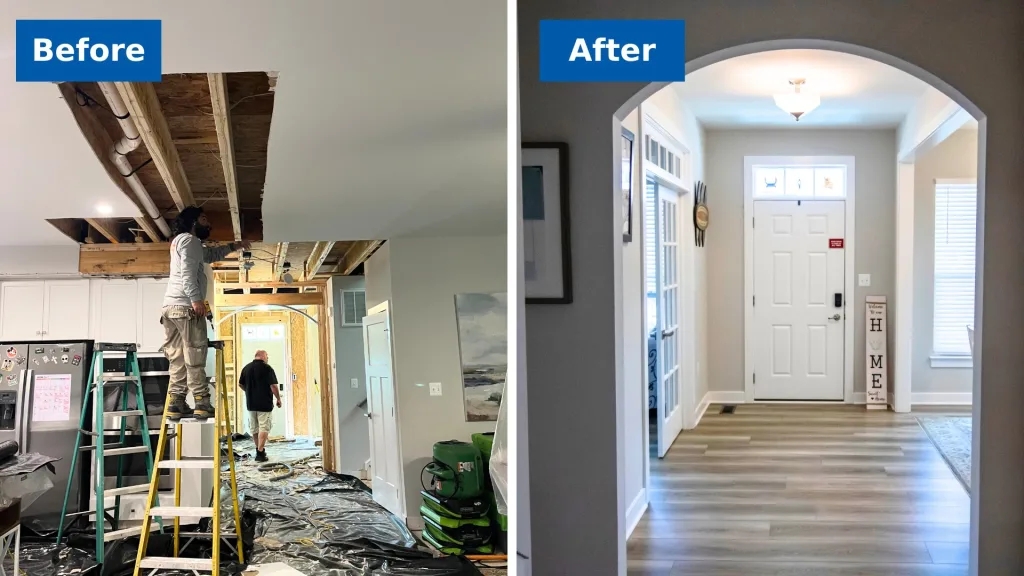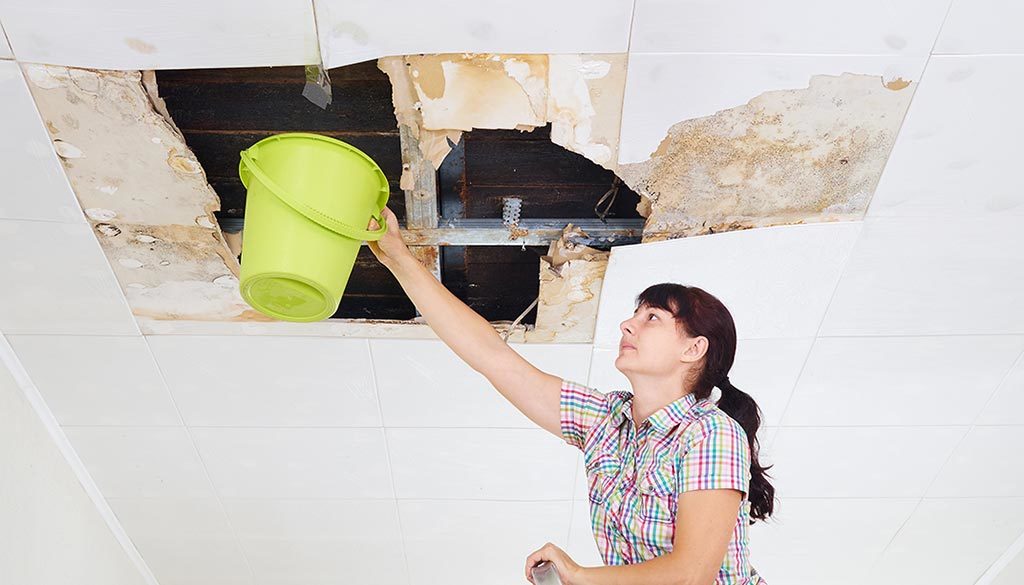The Full Guide to Browsing the Challenges of Water Damages Restoration
Water damage can strike suddenly, leaving you with an intimidating mess to clean up. Comprehending the causes and reviewing the extent of the damages is vital. Your immediate actions can make a considerable distinction in the result. But what steps should you take first, and how can you assure you're secured moving on? The solutions lie in a thorough method to reconstruction that every property owner need to know.

Understanding the Root Causes Of Water Damage
Water damage can strike unexpectedly, frequently leaving you scrambling to address the consequences. Recognizing the reasons for water damage is crucial for avoidance. Water Damage Cleanup. Common culprits consist of leaky roof coverings, burst pipelines, or malfunctioning home appliances. You might additionally come across concerns with your plumbing systems, like blocked drains or sewage back-ups, which can bring about substantial water invasion. Weather-related cases, such as hefty rainfalls or flooding, can additionally ruin your residential property. Furthermore, the age of your home contributes; older structures usually have weakening materials that are extra susceptible to leakages and damage. Even minor problems, like condensation from cooling and heating systems, can gather and trigger troubles gradually. By recognizing these potential resources of water damages, you can take positive measures to protect your home and reduce future threats. Remaining informed will encourage you to recognize early indications and act promptly when issues emerge
Evaluating the Degree of the Damage
Once you've determined a prospective water damage concern, examining the extent of the damage is important for determining the suitable feedback. Begin by evaluating the affected areas thoroughly. Look for noticeable indications like water stains, distorted floorings, or peeling off paint. Do not fail to remember to check hidden places, such as behind walls or under rugs, where moisture might linger.Next, identified the sort of water involved-- clean, grey, or black-- because this impacts the severity of the damages and required removal steps. Utilize a moisture meter to measure humidity levels in walls and floors, assisting you determine lingering moisture that might bring about mold and mildew growth.Document everything with images and notes, as this info can be vital for insurance coverage cases. By precisely reviewing the damages, you'll be much better outfitted to determine on the right repair technique and avoid more concerns down the line.
Immediate Tips to Take After Water Damages
After experiencing water damages, the first thing you require to do is examine the situation very carefully. Prioritizing your safety is essential, so ensure the location is risk-free prior to taking any kind of additional actions. Do not fail to remember to record whatever thoroughly, as this will certainly be very important for insurance policy claims and remediation initiatives.
Evaluate the Damages
Assessing the damages quickly is crucial for reducing the effect of water invasion. Start by inspecting the affected areas to establish the level of the water damages - Smoke Damage Restoration. Try to find noticeable indications like drenched carpetings, distorted floors, and stained walls. Look for hidden water, also, especially in crawl spaces and behind appliances. Make use of a dampness meter if you have one, as it can help identify locations that need interest. Document everything with notes and pictures; this will certainly be valuable for insurance policy claims. Bear in mind to assess your personal belongings too-- furniture and personal products may require expert cleansing or disposal. By recognizing the level of the damages, you can make enlightened choices about the next action in the repair procedure
Focus On Security First
Understanding the degree of water damages is just the beginning; your safety and security comes. Prior to you go into a water-damaged location, ensure to shut off the electrical energy and gas supply to stop any kind of threats. Wear protective equipment, consisting of handwear covers and boots, to protect on your own from contaminants. Beware of structural instability-- floorings, walls, or ceilings may have weakened. Avoid contact and telephone call experts for aid if the water is coming from a sewage source. Keep kids and family pets far from the damaged area. If you smell gas or see electric stimulates, evacuate promptly. Remember, prioritizing your safety assurances you can successfully resolve the damage without threat to your health and wellness. Constantly err on the side of caution.
Document Everything Completely
As you start addressing water damages, documenting whatever extensively is essential for both insurance policy claims and repair efforts. Begin by taking clear photographs of the impacted areas, capturing the level of the damages. Make certain to keep in mind the day and time of the occurrence. Produce a list of damaged products, including furnishings, home appliances, and personal belongings, in addition to their estimated values. Tape any kind of activities you take, like speaking to professionals or moving things to prevent more damages. Keep all receipts and invoices associated to the reconstruction procedure. When filing a case and help the repair team understand the circumstance much better, this documents will certainly reinforce your instance (Water Damage Repair). Remember, complete paperwork can make a significant difference in your healing trip

Avoiding and minimizing further problems Mold Development
When water damage takes place, acting rapidly can significantly decrease the threat of additional concerns, specifically mold and mildew growth. First, get rid of any kind of standing water using pumps or wet vacuums. Next off, dry out the impacted areas extensively. Open up home windows, make use of fans, and take into consideration dehumidifiers to expedite the drying out process. Go for a moisture level below 60% to inhibit mold spores from settling.Inspect all products and surfaces affected by water; discard anything that can not be adequately dried out, like drenched carpetings or drywall. Tidy and disinfect continuing to be surface areas with a mixture of water and detergent, or a specialized mold-preventive solution.Keep an eye on the location over the next few weeks. If you discover any kind of moldy scents or staining, address it instantly. Bear in mind, timely activity not only prevents mold growth yet likewise safeguards your building and wellness.
Collaborating With Water Damages Reconstruction Professionals
After taking immediate steps to reduce water damages and prevent mold development, it's time to contemplate expert help. Water damage remediation specialists have the know-how and equipment needed to manage substantial damage efficiently. When you reach out, be prepared to explain the circumstance thoroughly. This helps them examine the intensity of the damages and prepare accordingly.Once they show up, anticipate a comprehensive assessment and an in-depth plan for repair. They'll use customized devices to extract water, dry impacted areas, and sanitize your area. Do not be reluctant to ask concerns throughout the procedure; understanding their approaches can ease your concerns.You ought to also discuss timelines and what to expect at each phase of the restoration. Working together freely with these experts warranties you remain educated and involved, assisting you regain your space much more successfully. Depend on their competence, and you'll see your home go back to its pre-damage problem.
Navigating Insurance Policy Claims for Water Damages
Maneuvering insurance claims for water damages can really feel frustrating, especially if you're not familiar with the procedure. Initially, assess your insurance plan to comprehend what's covered. Seek specifics on water damages, as not all plans treat it the very same. Document the damage thoroughly-- take images and make notes regarding what took place and when.Next, contact your insurance company promptly. Report the damages and give them with your documents. They'll appoint an adjuster to evaluate the scenario. Be prepared to answer inquiries and provide additional information as needed.Stay organized throughout the process. Maintain a record of all interactions, consisting of days, names, and information of discussions. Do not wait to appeal if your case is rejected or you feel it's inadequate. Know that persistence can pay off, so supporter for on your own to ensure you receive the insurance coverage you're qualified to.
Tips for Future Water Damage Avoidance
To keep your home safe from water damages, routine maintenance checks are necessary. Do not overlook the worth of installing water detection systems, as they can notify you to leaks prior to they end up being significant concerns. By staying aggressive, you can conserve yourself time, cash, and tension in the future.
Normal Maintenance Checks
While it might appear tedious, carrying out regular upkeep checks can significantly lower the danger of future water damage in your house. Begin by examining your roofing for missing leaks or shingles; even little concerns can intensify quickly. Check downspouts and gutters to assure they're clear and directing water away from your structure. Search for indications of dampness in basements or crawl rooms, and deal with any type of leakages from pipelines or devices immediately. Remember to test your sump pump on a regular basis to verify it's functioning effectively. Don't ignore your washing equipment pipes; replace them every few years to stop burst disasters. By remaining proactive with these checks, you'll save on your own time, cash, and stress in the lengthy run.
Install Water Discovery Solutions

Often Asked Inquiries
The length of time Does the Water Damage Reconstruction Process Generally Take?
The water damage reconstruction process generally takes anywhere from a few days to a number of weeks, depending upon the extent of the damages. You'll intend to act rapidly to decrease further problems and accelerate the process.
Can I Remain in My Home During the Remediation Process?
You can remain in your home during the repair procedure, but it relies on the extent of the damage. If it's extreme, it's safer to briefly transfer till the work's completed and your home's secure.
What Individual Items Can Be Salvaged After Water Damages?
After water damage, you can often recover items like apparel, books, and electronic devices, provided they're not soaked or musty. Constantly assess their problem rapidly and speak with professionals for suggestions on remediation and safety and security.
Are There Any DIY Approaches for Bring Back Water-Damaged Items?
Yes, you can make use of DIY approaches to restore water-damaged things. For furniture, air-dry and use a wood conditioner. For fabrics, wash them extensively and air-dry. Always look for mold before trying any repair.
Exactly How Can I Recognize Hidden Water Damage in My Home?
To recognize covert water damages, check for water spots on walls and ceilings, pay attention for trickling audios, feel for moisture in products, and take a look at areas near pipes for indicators of mold and mildew or mildew growth. As soon as you've identified a prospective water damage problem, examining the level of the damages is important for establishing the appropriate feedback. As you begin resolving water damage, documenting every little thing completely is crucial for both insurance cases and repair efforts. Water damage reconstruction specialists have the competence and tools required to handle extensive damages properly. Installing water detection systems can be a game-changer for avoiding future water damages in your home. The water damages remediation procedure normally takes anywhere from a few days to numerous weeks, depending on the degree of the damages.